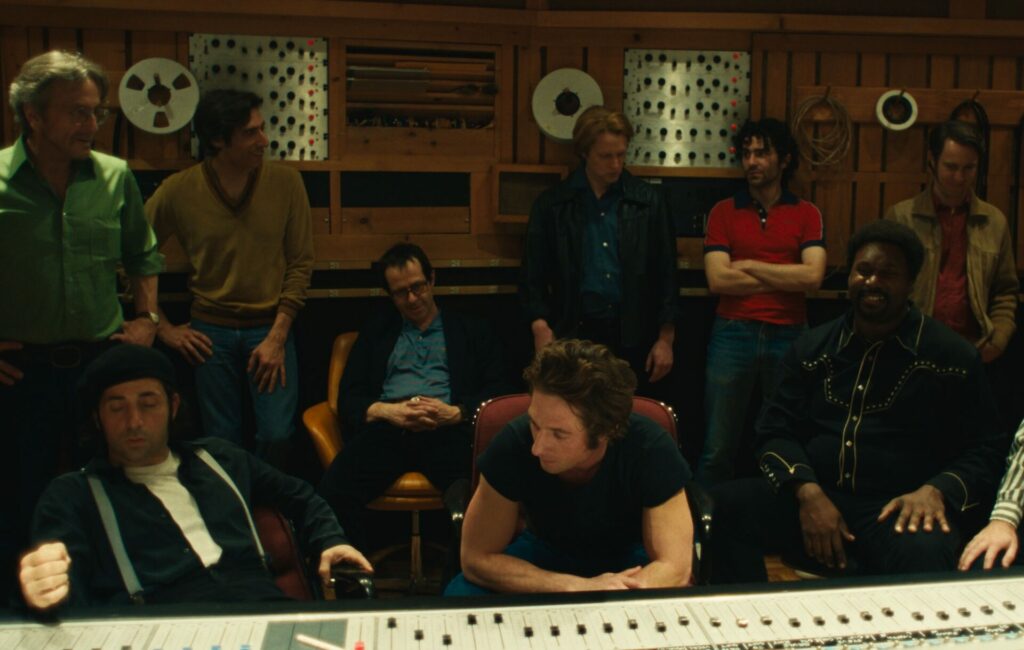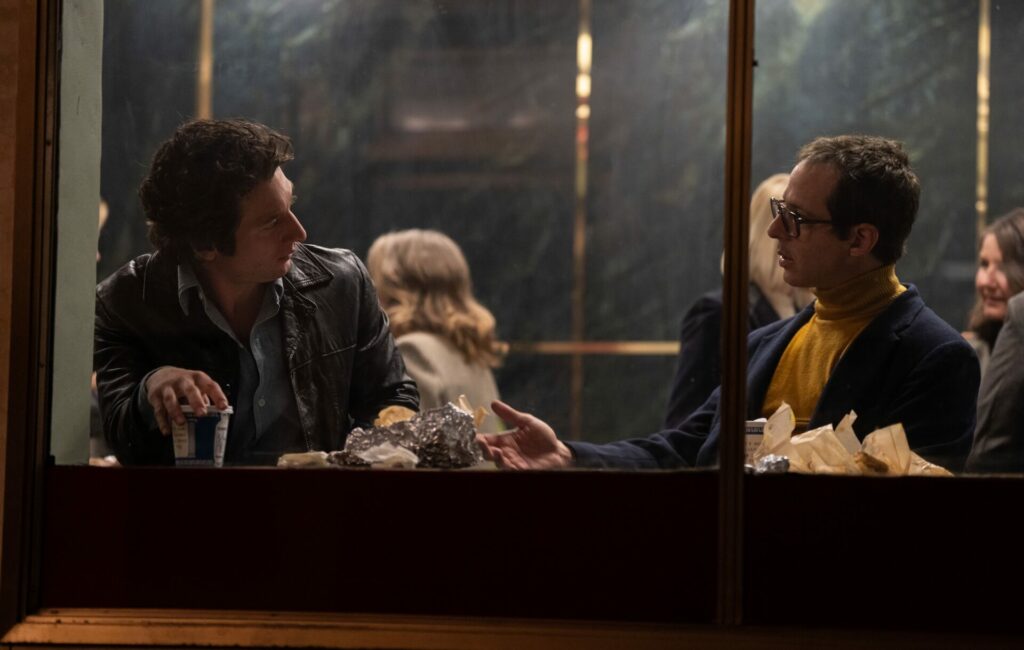‘Springsteen: Deliver Me from Nowhere’: Unique biopic shows The Boss facing his demons
Scott Cooper, Jeremy Strong, Stephen Graham and Odessa Young explain how Cooper’s tender new biopic gets to the conflicted heart of a nation’s beloved mouthpiece

Warren Zanes, the author of 2023 book Deliver Me from Nowhere: The Making of Bruce Springsteen’s Nebraska, has described the 1982 album as “the greatest left turn in the history of American popular music”. On the brink of superstardom but equally close to complete mental collapse, The Boss left the undeniable hits ‘Born in the USA’, ‘Dancing in the Dark’ and ‘Glory Days’ to the side and instead released a roughly recorded, deeply imperfect set of solo acoustic songs that laid bare his unresolved childhood trauma, fear for the future and the mental decline he was currently experiencing. It’s his most unique album, and to many his very best.
There are countless triumphant moments in Bruce Springsteen’s career that could have made up the core of a traditional biopic. For director Scott Cooper to choose this dark, emotionally conflicted moment in his career to spotlight in new film Deliver Me from Nowhere feels a risk – not unlike the one Bruce took when sharing that particular version of Nebraska with the world.
The first step was getting Springsteen himself on board. Remembering a trip he and Zanes took to the singer’s house to first float the idea, Cooper tells Rolling Stone UK what he told Springsteen: “I know that you’ve said no to everybody who’s asked you to make a film. I understand why. There are many chapters in your life that can be told.” It was this particular chapter that had resonance with Cooper – “The album came to me at the right time in my life, when I most needed it,” he says – and the desire to tell lesser-known stories about the world’s biggest stars.
“I had long wanted to make a film about the last day in the life of Elvis Presley,” the director says. “I had been offered to make Elvis’ film a few years back and I declined to do that. I said [to Bruce] that this is the story I want to see, because there’s a lot about it that I didn’t know. People that love [him] won’t know this.” He also pointed to Springsteen’s 2017 biography, where almost every era of his career is well chronicled. The Nebraska era got a single page.
Reluctant to see an overly sanitised portrayal of himself on film, Springsteen was immediately drawn to the idea of documenting this largely unseen, emotionally conflicted time in his life. Coming off the tour for The River at the start of the 1980s, Springsteen was on the cusp of becoming the national icon he eventually turned into. Fast approaching in the rear-view mirror though were unresolved feelings about his relationship with his father and what he describes in Born to Run as “my first real depression”.
Asked by Cooper why Nebraska only got a single page in the autobiography, Springsteen told him it’s because the memories were “too painful”. The director responded quickly: “That’s why I want to make this film.”

In Deliver Me from Nowhere, Springsteen – played excellently by The Bear star Jeremy Allen White – returns home to New Jersey from tour to find himself unable to outrun his demons any longer. Through conversations with his longtime manager Jon Landau (played by Succession’s Jeremy Strong), flashbacks to the cruelty of his father (Stephen Graham) and a budding relationship with Faye (a composite based on a number of Springsteen’s early girlfriends, played by Odessa Young), we get a window into an artist knowing that he can’t embrace his inevitable commercial explosion without first dealing with what’s inside.
For a film like this to succeed, it needed not only the literal buy-in from the artist with regards to licensing the music, but also an emotional investment, and for Cooper to truly understand the undocumented details and emotions of the time. “I said to Bruce, if people understand this very painful chapter of your life, they’ll get a sense of exactly who Bruce Springsteen is and represents in all of his other records. It was critical that he was able to give me access into his emotional state.”
In the end, it turned out that Springsteen was able to give Cooper and the film’s cast and crew an enormous amount of his time, his stories and his love. “I didn’t think he would come to set much,” Cooper says, “but after he came the first time, he said, ‘Man, I love this! You’ve recreated such a difficult time in my life with such specificity – if it’s ok I just want to come back.”
“He was giving a lot of support to what we were doing,” adds Young, whose character seeks Springsteen to get help while also grieving the fact that he can’t give her what she needs at this moment. “What I love so much about the way their relationship happens is that it feels really grounded and universal,” she says. “It’s what we all deal with in relationships, whether we’re super famous rock stars or not.”
The hardest moments for Springsteen on set were around the recreation of his father’s house, where black-and-white segments see a firm and fierce Stephen Graham dispensing discipline on a young Bruce (Matthew Anthony Pellicano Jr.). “It was painful for Bruce,” Cooper says. “There were days that he couldn’t come to shooting because it was too hard to re-live that trauma.”

In this troubled time in his life, Springsteen leant heavily on Landau, with its most striking scene coming when calling his manager from Los Angeles, finally admitting that he had to seek professional help. He found himself in LA after a trans-country road trip with a friend, in the exact situation he wrote about nearly a decade ago on ‘Born to Run’: “The highways jammed with broken heroes on a last chance power drive / Everybody’s out on the run tonight but there’s no place left to hide.”
In Landau, he had a friend, confidant and someone who would fight his corner. “The first thing you glean from them is the strength of their connection and love,” Strong says. “Jon’s devotion to Bruce is as his friend and an article of faith. Bruce became Jon’s reason to believe.”
For Strong, it chimed with his own experience of helping White through the process of becoming Springsteen, one in which he says he put an awful lot of pressure on himself. White has described Strong as his “protector” through this process, something which deepened both their performances as an artist on his knees and a manager trying to keep his friend afloat.
“I observe the way Jon is with Bruce through a lot of research, and one of the things you understand very quickly is how devoted and protective of him he is,” Strong says. “I’m also a very devoted person to my art form and to people that I care about. I know how hard it is to do this, and the risks involved.” He likens the process to the care and guidance he also showed Sebastian Stan, who plays Donald Trump in 2024’s The Apprentice, with Strong as his vicious lawyer Roy Cohn.
“He had to walk across the Philippe Petit highwire to do that, and Jeremy had to do that with this as well,” Strong says. “It’s nothing that you’d be able to point your finger at and see, but invisibly I’m sure he could feel that [support]. I felt very protective of him.”

For Graham, who also plays a father in 2025’s most successful TV show, Netflix’s Adolescence, embodying Doug Springsteen was a role that could only be undertaken having asked his own questions. “What kind of a man do you think he was?” Graham remembers asking Springsteen. “He was minimalistic with the language that he spoke about his father in,” he says of the response, “but what I did see was a man who really loved his father. For me, it’s then a sense of duty and obligation to take what’s on the page and embody it with my own experiences.”
Between Deliver Me from Nowhere and Adolescence, Graham’s experience of portraying fathers has led him to launch a new project encouraging fathers to write to their sons, that will eventually be turned into a book of letters.
“Doug and Bruce didn’t really communicate,” Graham says, but the beauty of Bruce, and his humility, was that he empathised what his dad had been through, because he’d suffered from his own depression.” The actor wanted to “promote communication even more between fathers and sons,” adding: “It’s a wonderful opportunity for fathers who maybe don’t have the opportunity to talk to their sons to write a letter. Even for me – I live with [my son] Alfie all the time and we’ve got a boss relationship, but I’ve love to have something down in print that I’ve written to him.”
Bruce Springsteen has long been regarded as the most relatable superstar the world has produced in the last century – a blue-collar hard worker with honesty in every sinew of his music. In Deliver Me from Nowhere, he becomes even more relatable when shown as a depressive, a mentally scarred son and a lousy boyfriend. “We wanted to strip Bruce Springsteen of his iconography, his mythology,” Cooper says. “We’re not making a film about a hero. We’re making a film about a man who has the courage to look inward and tell his most honest and painful truth.”
“Ultimately, this is a movie about repairing trauma through art,” Strong adds. “Bruce has written about this very openly in his autobiography and in his music. He lives 20 minutes from where he grew up, and he still drives over to that house in Freehold. He remains connected to what is a very vital power source for him, which is his past. This movie shows the moment where he began to shake hands with that past.”
‘Springsteen: Deliver Me from Nowhere’ is in UK cinemas from October 24.
